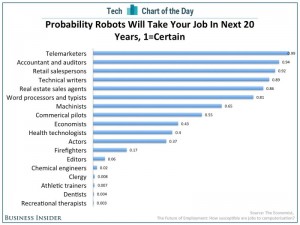Nearly everyone agrees the world will look different in years to come. For many, the future has arrived. Robots and other forms of automation are not just destroying jobs at an accelerating pace but driving many occupations into extinction.
For nearly 15 years I warned of a Perfect Labor Storm, a time when work, the workplace, and consequently the workforce would see revolutionary change at an unprecedented pace. I wasn’t the first to forecast the changes we are experiencing now. I wasn’t the loudest voice either. But I was a steady, reliable messenger of a daunting prediction that unfortunately has come true.
I did however underestimate the changes on two accounts.
First, my use of the word “storm” apparently erred on the side of conservatism. While disruptive and often devastating, storms pass. People pick up the pieces and move on. Life is disrupted but not devastated. Most people go back to living the way it used to be.
But what we are experiencing is not a storm but a “Job Apocalypse”.
Up until now technological progress produces two competing effects: job destruction and increased production. While new technology often replaces workers, the new technology improved productivity, which tends to lower the cost of production, which creates more demand, which creates new jobs.
These new jobs for the most part require new skills. The skills are typically acquired through more advanced education. Workers who acquired the education and skills have been rewarded with good jobs and higher wages.
At least that’s the way it has worked for the past several centuries.
But now technological progress threatens to alter the course of history.
Oxford University researchers Carl Benedikt Frey and Michael A. Osborne in their daunting landmark study give a taste of what’s to come. They estimate that 47 percent of U.S. jobs are at “high risk” of being taken over by robots in the next decade or two. And we’re not talking about just production jobs requiring more low-level skills. Affected jobs include accountants, physicians, lawyers, and architects Loan officers, tax preparers, paralegals, and even roofers are at risk. Even more susceptible are low-skill-level jobs such as retail cashiers and salespeople, telemarketers, toll booth operators, and postal workers. Even professional drivers (truck, bus, taxi) are at risk. (If you are suspicious, then you are ignoring how the Google car is changing transportation.)
They wrote in their paper:
Our model predicts that most workers in transportation and logistics occupations, together with the bulk of office and administrative support workers, and labor in production occupations, are at risk… More surprisingly, we find that a substantial share of employment in service occupations, where most US job growth has occurred over the past decades (Autor and Dorn, 2013), are highly susceptible to computerization.
 While the trend in recent decades has been towards a hollowing out of “middle-skill” jobs and an increase in low-paying service sector jobs and high-paying, highly educated jobs, Frey and Osborne expect that automation in the future will mainly substitute for “low-skill and low-wage” jobs.
While the trend in recent decades has been towards a hollowing out of “middle-skill” jobs and an increase in low-paying service sector jobs and high-paying, highly educated jobs, Frey and Osborne expect that automation in the future will mainly substitute for “low-skill and low-wage” jobs.
What’s most troubling about all these changes are that advances in technology and computerization have outpaced our ability to find new uses for labor. In other words, automation has replaced people at a faster rate than demand for products and services has grown meaning the demand for skills has lagged. Since the number of workers with higher education degrees has exploded, many of these higher-skilled workers are accepting jobs traditionally performed by less educated, low-skilled workers. The minimally-education, low-skill worker is subsequently pushed further down or out of the workforce entirely.
No one knows for sure what the careers of the future will look like. But the people at the cutting edge of workplace and workforce trends are already watching old jobs disappear at an accelerating rate.
Sources:
Jobs That Will Be Lost to Robots

I’m agree that jobs are disappearing at rapid rate with the change in technology and are replaced by robots in future and in present on certain jobs.Traditional way of working is changed and computerized ways are being introduced by many of the organisations that surely influence the skills required for jobs. But it is required for the develop the world to find the new and unexplored areas to work and upgrade the quality and standards of work and products of all the jobs. so, we need to watch the positive side of the coin too.